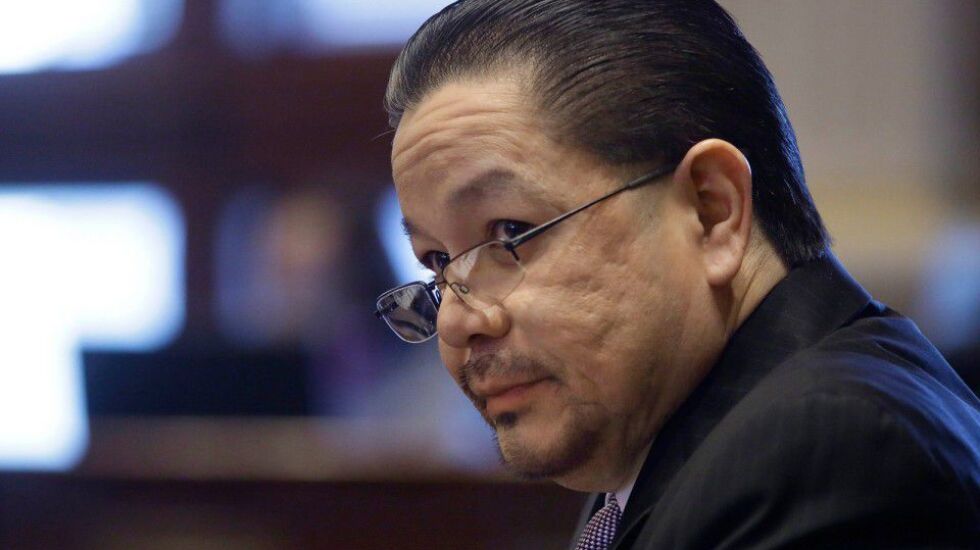
Illinois state senator-turned-government mole Terry Link infamously asked, “What’s in it for me?” while wearing a wire in a 2019 federal bribery sting that snared a corrupt legislative colleague.
Link played the role of undercover hero in that encounter, but he’s far from being a study in ethical behavior.
As part of a plea deal, the Vernon Hills Democrat admitted underreporting his income for four years to avoid paying his share of state and federal income taxes. He’s awaiting sentencing after pleading guilty to federal tax evasion.
And yet, taxpayers likely will keep paying Link handsomely for years to come: He’s gotten $200,000 from his state pension — and counting.
Those payments are part of nearly $2 million in state retirement checks WBEZ documented going out to a mix of federally charged, convicted and self-admitted felons who once served under the Capitol dome in Springfield. In some cases, loved ones were the beneficiaries.
Former Illinois House Speaker Michael Madigan and his indicted inner circle all have drawn hundreds of thousands of dollars in state pension payments while they await upcoming federal corruption trials. Madigan has pleaded not guilty.
Former state Rep. Edward Acevedo, D-Chicago, pleaded guilty to federal tax evasion and last year was drawing his state pension while serving time in a federal prison.
All of those cases won sign-off from an obscure state panel, often on the advice of Illinois Attorney General Kwame Raoul. Raoul’s office found the criminal wrongdoing of people like Acevedo and Link didn’t disqualify them from their pensions because it wasn’t linked to their work as public officials.
Link’s undercover work for federal law enforcement contributed to the 2021 bribery conviction of former state Rep. Luis Arroyo, D-Chicago.
But it was Link’s later admission to federal tax evasion that put his state pension at risk.
He admitted to using more than $73,000 in campaign funds for personal expenses and not declaring that as income to the government.
The state panel that approved Link’s pension — the state General Assembly Retirement System board — received legal guidance from the attorney general, who said Link’s felony wasn’t enough to disqualify him.
“This conclusion should not be interpreted as condoning Link’s misconduct,” the attorney general’s opinion stated.
“Although Link violated federal law, it cannot be said, based on the information currently available to this office, that such conduct was directly related to the performance of his official duties as a state senator,” the opinion stated.
Raoul’s office cited a federal prosecutor’s statement in court that the tax charge against Link wasn’t related to his service as a state senator.
Using Raoul’s opinion as a basis, the state retirement system board voted 5-0 to grant Link his pension, which this year equals $7,753 per month.
Link’s lawyer did not respond to WBEZ’s inquiry about his state pension. Raoul’s office declined comment, and U.S. Attorney John Lausch’s office also declined to comment.
House Minority Leader Tony McCombie, R-Savanna, said she was unaware that Link’s pension benefits were approved and said she is stumped at how anyone could interpret his wrongdoing as not being related to his job as a state senator.
“How this is considered unrelated is really beyond me,” McCombie said.
There are questions about what happens to a former state official’s pension if their felony occurs after leaving office.
Acevedo is one example in that questionable gray area. He initially began receiving state pension checks in 2018 but had them suspended briefly in early 2022 due to his guilty plea. But they were reinstated last May based, in part, on an opinion from Raoul, who determined Acevedo’s wrongdoing occurred after he left public office and shouldn’t cost him his legislative pension.
Since the start of 2022, state retirement system records show Acevedo has received $265,252 in pension payments, and another nearly $65,000 of Acevedo’s state pension earnings have gone to an ex-wife under a divorce settlement.
Acevedo reemerged as a focal point of federal investigators last fall. A government filing in October said Acevedo was paid $22,500 despite doing no work for AT&T Illinois as part of an illegal company effort to secure support from Madigan for 2017 legislation the company was pushing.
Acevedo’s defense lawyer, Gabrielle Sansonetti, declined comment about state pension payments to Acevedo.

Another legislator who ran into legal trouble with the feds was former state Sen. Martin Sandoval.
In early 2020, Sandoval agreed to a federal plea deal in which he admitted to pocketing more than $250,000 in bribes while in office, and he pleaded guilty to bribery and tax evasion. Sandoval also pledged cooperation with the feds in future investigations.
However, in December of 2020, he died from complications arising from COVID-19 before being sentenced. As a result, the plea deal was nullified and he was never officially convicted of a felony. His widow was then deemed eligible to draw a portion of his pension. She has received $99,372 since.
State Sen. Robert Martwick, D-Chicago, is chairman of the General Assembly Retirement System board and defended his panel’s actions involving Sandoval, Link and Acevedo.
“We seek to follow the law. We seek to follow the recommendations of the attorney general who is charged with rendering this opinion. But every one of those decisions, they never come easy,” Martwick told WBEZ.
Martwick said he is satisfied with the current laws that allow them to strip pensions for office-related felonies.
“In some instances, you could argue it maybe even hurts people it’s not intended to,” Martwick said, citing a spouse or children who might suffer financially from the cutoff of a corrupt ex-lawmaker’s pension. “That lends to the severity of it. So I think the laws as they exist are pretty good.”

The General Assembly Retirement System board’s decisions on pensions could soon come under scrutiny again.
Madigan, his one-time aide Timothy Mapes and Madigan’s political confidante Michael McClain are drawing state pensions as they await their own federal criminal trials. McClain’s trial, along with three former Commonwealth Edison executives and lobbyists, begins next month.
Madigan’s alleged wrongdoing occurred during his record-breaking tenure as a legislative leader, but the others are accused of criminal acts after being in the legislature or on the state payroll.
Madigan has been hit with bribery, racketeering and conspiracy charges related to alleged shakedowns of ComEd and AT&T of Illinois for no-work jobs for his political associates. State records show Madigan, who resigned from the House in February 2021, began drawing his legislative pension a month later and so far has received $200,380.
Mapes, who resigned as Illinois House clerk in June 2018 after a lengthy stint as Madigan’s chief of staff, has been accused of lying to a federal grand jury and attempted obstruction of justice related to the federal Madigan investigation. Mapes began drawing his state pension in July 2018 and so far has received $636,326, state records show.
McClain, a former Illinois House member and ComEd lobbyist who goes on trial March 6, faces conspiracy and bribery-related charges for his alleged role in the ComEd and AT&T scandals involving Madigan. McClain has drawn a legislative pension since 2002 with the total payout now standing at $308,635, state records show.
“If you asked 100 people on the street if this was OK, 100 people on the street would say no,” said state Sen. Mary Edly-Allen, D-Libertyville.
She favors barring ex-lawmakers from drawing state pensions if they are convicted of felonies.
“We need to start over again and pass something that doesn’t allow this to happen in the future,” she said. “It’s really a betrayal of the public’s trust on many levels.”
Dave McKinney covers Illinois politics and government for WBEZ.







